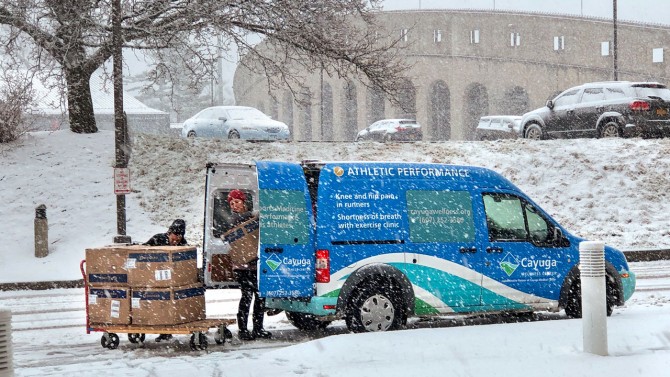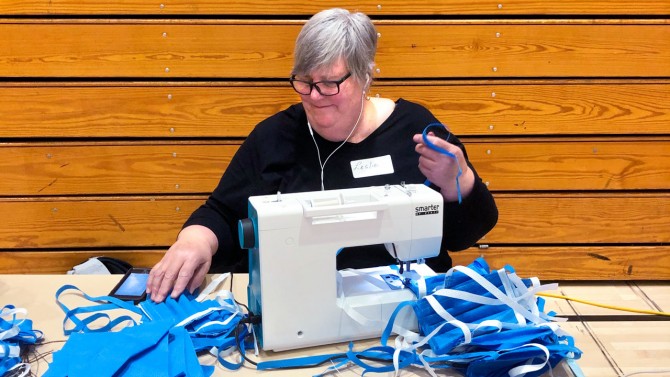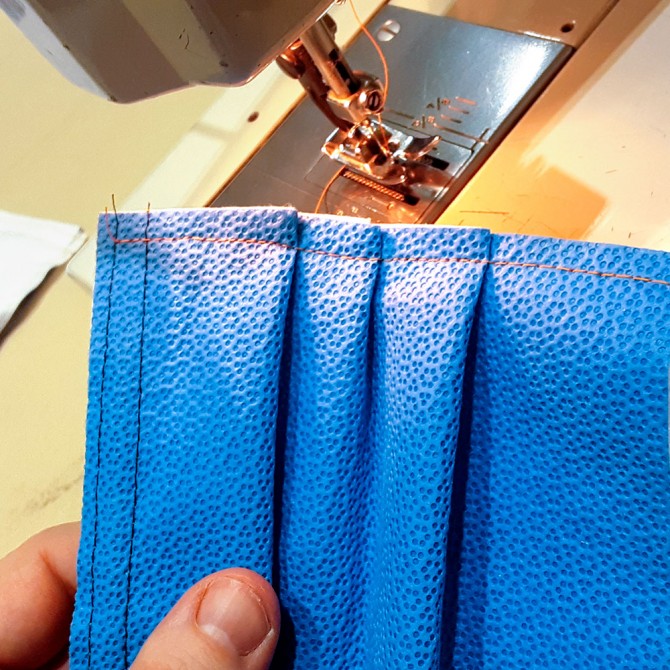On Cornell's Ithaca campus this week, in the midst of a spring semester suddenly interrupted by the COVID-19 pandemic that has emptied dorms, classrooms and community spaces, a basketball court in Bartels Hall stirred to life with a new, urgent mission and two dozen volunteers.
Surgical nurses from Cayuga Medical Center unload the first batch of supplies in front of Bartels Hall March 23, to begin setting up for the volunteer mask-making work stations.
Beginning early Tuesday morning, stationed at sewing machines on tables spaced apart to observe safe social distancing guidelines, community members launched a coordinated sewing effort to produce surgical masks for Cayuga Medical Center in Ithaca. The hospital, like many others across the country, is facing looming shortages of personal protective equipment (PPE).
Carol O'Driscoll, director of surgical services for CMC, said hospital officials had been aware for a while that a long-term shortage of medical supplies was likely as the coronavirus spread, especially since many of the needed supplies are manufactured in China. The hospital already had begun reducing the use of certain supplies as much as possible.
O'Driscoll said she had what her kids are calling her "Scarlett O'Hara moment" - referring to the "Gone With the Wind" character's crafting a gown out of draperies - when she was walking in a hospital hallway and saw the bags of upcycled surgical instrument "blue wrap" that a CMC program had been turning into blankets for the homeless in Ithaca.
Drew Hutchins, Cornell's associate head coach of men's soccer, cuts blue wrap as part of the volunteer surgical mask-making efforts at Bartels Hall. He was one of nearly two dozen volunteer cutters and sewers on March 25.
"I thought, if we can sew blankets, we can sew masks," she said.
After doing some research, she found out that the blue wrap - of which there is not currently a shortage - had the required permeability for surgical mask standards. She asked a few of her recovery room nurses who could sew to create a prototype.
"We brought this forward to our senior leadership, and a few people reached out in the community to find a place to do this sewing," she said. Current social distancing requirements in the face of the pandemic meant that there was no space in the hospital that would suffice to be able to produce the quantities that would be needed, as sewing machines and tables would be limited to one volunteer each with proper spacing between.
Several CMC staffers and administrators had connections to Cornell staff, and university leaders were quickly on the case.
Ryan Lombardi, Cornell's vice president for student and campus life, consulted with facilities staff and athletics leadership.
Volunteer Leslie Schultz works at one of the sewing tables at Bartels Hall March 25.
"Our first thought was that Cornell has big spaces that aren't being used right now," he said. They quickly decided on one of the Bartels Hall side practice courts, with good floor space and easy access to restrooms, to set up the operation.
"It was a no-brainer," added Matthew Coats, associate director of athletics for internal operations, who helped procure and arrange for the transformation of the court.
The space was set up on Monday; meanwhile, O'Driscoll put out a call for volunteers through local Facebook sewing and quilters' groups. Twenty volunteers - 10 fabric cutters and 10 sewers - turned out 300 masks on the first day of operation, "which is phenomenal," she said.
Another Cornell connection - this one through the College of Human Ecology's Department of Fiber Science & Apparel Design - is expected to ramp up the surgical mask efforts even more. Kim Phoenix, a lecturer in FSAD, is one of O'Driscoll's volunteer sewers and contacted Charles Beach Jr., supervisor of the college's Digital Design and Fabrication Studio, to request that he laser cut all the surgical mask patterns, saving volunteer cutters' time and allowing all tables in Bartels to be used as sewing stations.
"I am glad to be able to do something to help," Phoenix said Wednesday during a brief break from sewing. "I have a son who is a firefighter and a daughter who is a physical therapist (both in Montana), and both of them are working through this. I just couldn't stay home knowing those in the front line need help."
With the mask patterns being laser cut, the sewing capacity at Bartels could eventually increase to 60 tables and nearly 1,000 masks produced per day, O'Driscoll said, "which would be enormous for our entire community. Not just at hospitals, where now everyone is wearing masks, but the nursing homes, the physicians' offices, the baggers at Wegmans; all of these people are asking for masks. We feel we could make a huge contribution in distributing these."
A close-up view of the upcycled surgical instrument "blue wrap" being turned into surgical masks.
O'Driscoll also is researching whether any of the sewing stations could eventually also be used to produce surgical gowns if the proper type of material can be obtained.
Sewing volunteers sought










